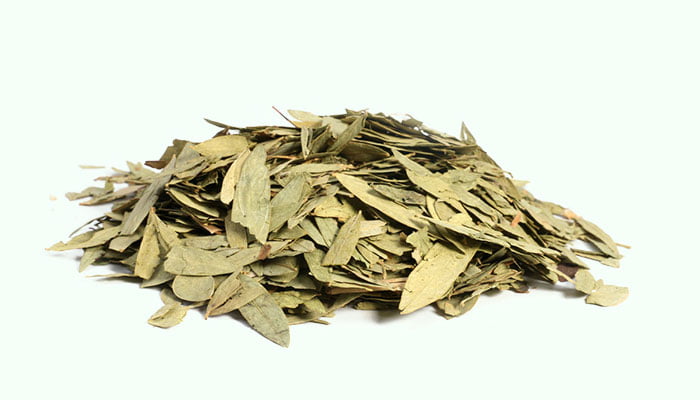What Is Fan Xie Ye
Fan Xie Ye commonly known as Folium Sennae or Senna Leaf is the leaf of Cassia angustifolia or Cassia acutifolia, which is a dwarf shrub belonging to the family Leguminosae. It is a medication used to treat constipation and empty the large intestine before surgery, which first appeared in <Yin Pian Xin Can> (New Reference of Prepared Medicines) in the Republic of China (1935 AD).
Cassia angustifolia is native to India and is mainly distributed in Pakistan, Algeria, Libya, Egypt, Sudan, and the Republic of Somalia. Cassia acutifolia is native to the Nile River basin in tropical Africa.
Although both species have been introduced in China, the yield is very low. 90% of the senna leaf used as a traditional Chinese medicine comes from India.

In autumn, people pick the leaves of Cassia angustifolia or Cassia acutifolia, remove their impurities, dry them in the sun, and make them into Chinese herbal medicines.
The leaves of Cassia angustifolia contain sennoside A, sennoside B, sennoside C, sennoside D, rhein-8-glucoside, aloe-emodin, aloe-emodin-8-glucoside, rhein, free anthraquinones, anthraquinone glycosides, dianthrone glycosides, isorhamnetin and kaempferol. The leaves of Cassia acutifolia contain sennoside A, sennoside D, rhein glucoside, rhein-8-glucoside, rhein, aloe-emodin, kaempferol, and kaempferitrin.
According to <Yin Pian Xin Can> (New Reference of Prepared Medicines), the medicinal nature of Fan Xie Ye is relatively cold, with a sweet and bitter taste. It has a certain therapeutic effect on the pathological changes of the large intestine meridian.
In traditional Chinese medicine, Fan Xie Ye is used to purge heat, relieve constipation, induce diuresis, treat edema, acute gastritis, intestinal obstruction, acute pancreatitis, cholecystitis, gallstones, chronic renal failure, biliary ascariasis, epidemic hemorrhagic fever, and promote early recovery of intestinal function after surgery.
Benefits
- Eliminating edema caused by ascites.
- Stimulating the pelvic ganglia causes contraction of the large intestine and inducing diarrhea.
- Relieving habitual constipation, constipation in the elderly, and constipation caused by heat retention.
- Blocking the transmission of acetylcholine at the motor nerve endings and skeletal muscles, relaxing the muscles, and relieving spasms.
- Enhancing smooth muscle contraction and inhibiting the damage of indomethacin to the gastric mucosa.
- Increasing the number of platelets and fibrinogen, enhancing the activity of thromboplastin, and accelerating blood clotting.
- Inhibiting Escherichia coli, Proteus, Shigella, Streptococcus A, and Candida albicans.
- In modern medicine, it is also widely used for intestinal cleaning before abdominal surgery and anal diseases.
Combinations
- It can be used in combination with Chen Pi (Tangerine Peel), Shan Zha (Hawthorn Fruit), Mu Xiang (Radix Aucklandiae), etc. to improve appetite and alleviate dyspepsia.
- It can be used in combination with Hou Po (Magnolia Bark), Zhi Shi (Fructus Aurantii Immaturus), etc. to treat habitual constipation and constipation caused by heat retention.
- It can be used in combination with Qian Niu Zi (Morning Glory Seeds), Da Fu Pi (Pericarpium Arecae), etc. to treat edema caused by ascites.
- It can be used in combination with San Qi (Notoginseng Radix et Rhizoma), Bu Gu Zhi (Fructus psoraleae), Da Huang (Radix et Rhizoma Rhei), etc. to treat obesity.
- It can be used in combination with Bing Lang (Semen Arecae), Gua Lou (Fructus Trichosanthis), Yin Chen (Capillary Wormwood), Chen Pi (Tangerine Peel), etc. to treat ascarid intestinal obstruction in children.
Side Effects
- It is a Chinese herbal medicine that cannot be taken for a long time or in large doses. Overdose of it may cause nausea, vomiting, abdominal pain, or tarry stools.
- Taking it for a long time may cause drug addiction. Some patients with constipation stop taking it and may have constipation again.
Precautions and Warnings
- The dosage of Fan Xie Ye should be controlled at 1.5-6g.
- It can be made into a decoctions or brewed in boiling water.
- When making prescriptions containing it, other medicines should be boiled first, and when the other medicines are almost ready, add Fan Xie Ye and decoct them slightly.
- People who are allergic to senna should not take it.
- Patients with deficiency cold of the spleen and stomach should not take it.
- Patients with loose stools or diarrhea should not take it.
- Pregnant women, breastfeeding women, and menstruating women should not take it.
- It should not be taken with antibiotics, vitamins, anti-intestinal parasites drugs.
